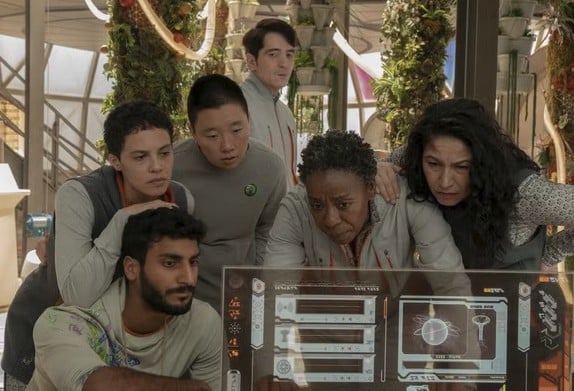Watercooler Pick
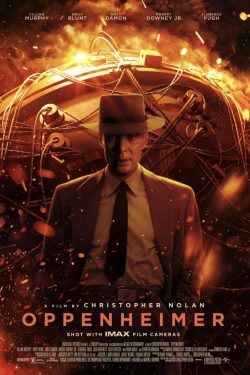
Oppenheimer
- Movie
- Where to Find It: theaters
- Rating: R
- Release Date: July 21, 2023
- Runtime: 3 hours
Recommended by:
Share on social media
Find More Watercooler Picks
A double-edged historical epic, Oppenheimer is a crushing tale of valiant heroism and devastating realization. The film maps J. Robert Oppenheimer’s journey from college to end days, but pays particular mind to the Manhattan Project and the years that follow, as Oppenheimer’s catastrophic achievement begins to devour his heart and poison his soul.
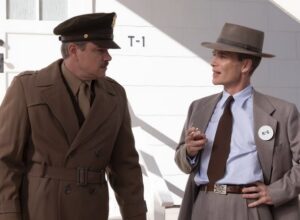
Oppenheimer is the brainchild of Christopher Nolan, the fabled director of Hollywood’s modern age and a curator of the grandiose. His previous credits include Memento, Interstellar, and Dunkirk; a film which is tangentially similar to Oppenheimer in both structure and subject matter. Nolan is joined by an explosive cast, which includes Robert Downey Jr. (as Lewis Strauss), Matt Damon (Leslie Groves), and Cillian Murphy as the titular J. Robert Oppenheimer. They’re supported by Emily Blunt (Oppenheimer’s wife Kitty), Florence Pugh (as his lover Jean Tatlock), and Gary Oldman (President Harry Truman).
Look for two out of the box cast members, Josh Peck (Kenneth Bainbridge) and Devon Bostick (Seth Neddermeyer) — both beloved by Gen Z for their performances in Drake and Josh and Diary of a Wimpy Kid, respectively.
Oppenheimer is a movie centered on creation and marred by destruction. It’s unrelenting, painfully personal, and, for a film about a bomb, eerily quiet. While the average 21st century blockbuster biopic is rife with tremendous highs and discouraging lows (see The Social Network, The Wolf of Wall Street, and an endless number of popstar movies), Oppenheimer is devoid of narrative giddiness. It’s a film about the decimation of a man’s soul.
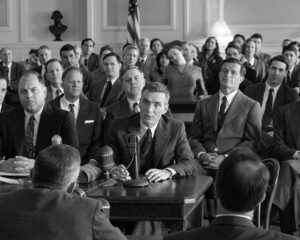
In the typical fashion of Christopher Nolan, Oppenheimer plays with time — both in-universe and in post production. As in Dunkirk, Nolan employs three different vessels in tackling Oppenheimer’s story: the 1959 Senate confirmation hearing of Oppenheimer’s bitter rival, Lewis Strauss; the 1954 security hearing of Oppenheimer regarding his communist ties; and a traditional Hollywood retelling to fill in the gaps. In the film’s third act, these faraway plot devices become decisive moments in Oppenheimer’s biography, providing a sense of narrative payoff and righteous satisfaction, which are much needed in an otherwise dismal film.
In-universe effects are equally riveting, as flashbacks and hallucinations highlight personal demons and shattering minds in a visually-fascinating way. As the gravity of Oppenheimer’s work begins to affect him, he begins to see nuclear blasts everywhere, and is forced to watch as the people precious to him turn to hollow corpses. This combination of known fact and original interpretation underscore Nolan’s careful directing presence; the undisputed highlight of the film.
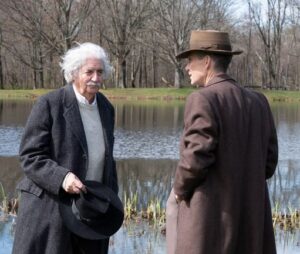
Of course, a picture of epic proportions can not be without its flaws. Because of its historical narrative, Oppenheimer features a good deal of name-dropping with few thorough explanations. At times, this style works perfectly — characters like Niels Bohr (the Danish physicist responsible for the Bohr Model of atomic structure), Werner Heisenberg (a German physicist and pioneer of quantum mechanics), and even president Harry Truman are exciting to encounter and important to the narrative. But periodically, these dramatic entrances make the film feel gimmicky and unserious. Albert Einstein in particular takes on the role of a Yoda-type guru who quite literally appears from the shadows in perhaps the film’s cheesiest moment. JFK’s name, as well, is thrown out in the same way a Marvel post-credit scene might mention a new Avenger.
This faux-grandiose tone is unfortunately not exclusive to Oppenheimer’s name dropping. Recent critics, such as Richard Brody for the New Yorker, have likened the film to a “movie-length Wikipedia article,” for its episodic structure and obsession with “making Oppenheimer a figure of conflicted conscience.” While these points are accurate, they are also symptoms of a bigger flaw of the film, that being a textbook dedication to style over substance. Even in its most profound moments, Oppenheimer can be held back by rapid cutting, an aesthetic obsession, and a script which often seems determined to deliver quotable lines rather than enhance the narrative. For this reason, the film has long stretches in which it plays like a feature-length trailer, making its 3 hour and 15 minute runtime seem needlessly long in an era of shorter-form blockbusters.

Despite all of this, Oppenheimer is still an unforgettable experience. It has a powerful adherence to its theme (the destruction of human conscience), a tremendous set of acting performances, and dazzling visuals — enough to excuse script-related shortcomings. The film undoubtedly skims the surface at points, but it also features a very real case study that allows viewers to create their own depth. As far as directing goes, Oppenheimer is Nolan at the top of his game, which is apparent in each carefully crafted shot and heartbreaking look Oppenheimer shoots at the camera.
A biopic of epic proportions, Oppenheimer is chock full of explosive blasts and guilty conscience. Flawless acting performances and artistic finesse make it a visual treat, while its relentless nature and powerful sense of injustice burn an image in your soul that doesn’t quite fade after leaving the theater.
History buffs, Nolan lovers, and fans of bright lights and soul-crushing sadness. A recurring sex flashback might discount your grandmother and your preteen children. Otherwise, it’s an interesting think-piece worth seeing with someone who will want to discuss it.
As with all Nolan films, the rewatch potential on Oppenheimer is enormous. Though it feels built for massive screens and reclining chairs, fans of the film should consider catching it a second time at home, where it’s easier to google names and pick up historical context. Ironically, reading J. Robert Oppenheimer’s Wikipedia page also might enhance the experience.
- Moods: enlighten me, stretch my mind, transfix me
- Interests: epic, history, psychological drama, true stories

Aaron Cohen




